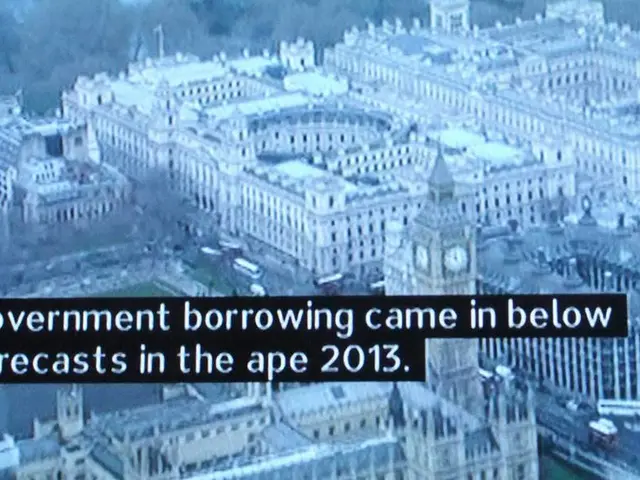United States and China conduct crucial dialogue in efforts to de-escalate their trade conflict.
Updated Article:
The first talks between the U.S. and China since President Trump slapped hefty tariffs on the Asian giant saw Treasury Secretary Scott Bessent and Trade Representative Jamieson Greer going head-to-head with Chinese Vice Premier He Lifeng in Switzerland.
This "important step" towards resolving the trade issue, as termed by a commentary published by China's state news agency Xinhua, marked a significant move between the world's two economic powerhouses. However, the discussions held in the Swiss ambassador's residence were shrouded in secrecy, with no details divulged about their progress.
The imposition of a staggering 145% tariff by Trump on Chinese goods since the beginning of the year and China's retaliatory 125% levies on U.S. goods have left both economies in a near-trade standoff. Trump hinted at a potential reduction in tariffs on Twitter, proposing an "80% Tariff on China seems right!"
But, clarification offered by US Commerce Secretary Howard Lutnick and Press Secretary Karoline Leavitt revealed that any significant drop in tariffs would require concessions from China as well. A move to an 80% tariff level could be symbolic, as the tariffs would still remain prohibitively high.
"The relationship's not good" says Bill Reinsch, a senior advisor at the Center for Strategic and International Studies. This ongoing trade war, with tariffs going back and forth, has only led to deteriorating relations between the two nations. But the fact that both sides are in discussions is seen as a positive sign by analysts.
China's Vice President's optimism ahead of the talks was bolstered by news that China's exports rose last month, despite the ongoing trade war, due to a re-routing of trade to Southeast Asia to sidestep U.S. tariffs. The Switzerland meetings happened just two days after Trump announced a trade agreement with Britain, which confirmed the U.S.'s willingness to negotiate sector-specific relief from recent duties.
However, a 10% baseline levy on most British goods remains in place, with Trump vowing to keep it for other countries under negotiation. Despite a few conflicting statements, the possibility of flexible baseline tariffs in exchange for "exceptional benefits" indicates that both the U.S. and China are open to compromise.
Bessent made it clear that the meetings in Switzerland would focus on "de-escalation" rather than a "big trade deal," while the head of the World Trade Organization (WTO) welcomed the talks as a positive and constructive step towards de-escalation. Ngozi Okonjo-Iweala emphasized that sustained dialogue between the world's two largest economies is crucial for easing trade tensions, preventing fragmentation along political lines, and safeguarding global growth.
In essence, the talks in Switzerland mark the beginning of a long process aimed at easing trade tensions, de-escalating the situation, and paving the way for more formal and detailed negotiations. But without substantial concessions and rollbacks of tariffs, a definitive resolution does not seem imminent.
- The United States and China, in discussions held in Switzerland, agreed on the importance of de-escalating their trade dispute, as confirmed by Treasury Secretary Scott Bessent and Trade Representative Jamieson Greer.
- Reporters speculated about the progress of the talks, but the discussions remained shrouded in secrecy, with no details divulged about their progress.
- The international business community closely followed the talks, with the prospect of a reduction in tariffs between the two economic powerhouses having a significant impact on the finance and industry sectors.
- The discussions were preceded by hefty tariffs imposed by both the United States and China, with Trump suggesting an 80% tariff on China, but clarification offered by US Commerce Secretary Howard Lutnick and Press Secretary Karoline Leavitt revealed that any significant drop in tariffs would require concessions from China.
- The ongoing trade war between the two nations has been a predominant feature in general-news, with Bill Reinsch, a senior advisor at the Center for Strategic and International Studies, asserting that their relations have deteriorated due to the back-and-forth imposition of tariffs.
- The World Trade Organization welcomed the talks as a positive and constructive step towards de-escalation, with WTO head Ngozi Okonjo-Iweala emphasizing that sustained dialogue between the world's two largest economies is crucial for easing trade tensions, preventing fragmentation, and safeguarding global growth.







